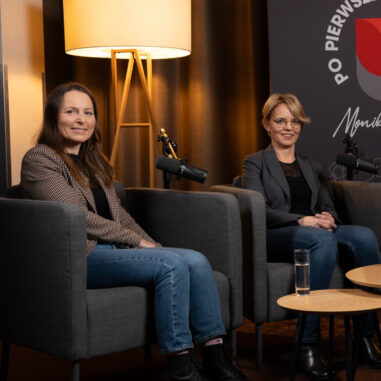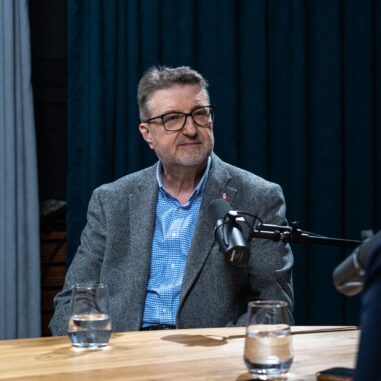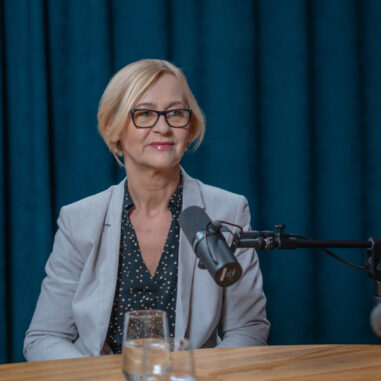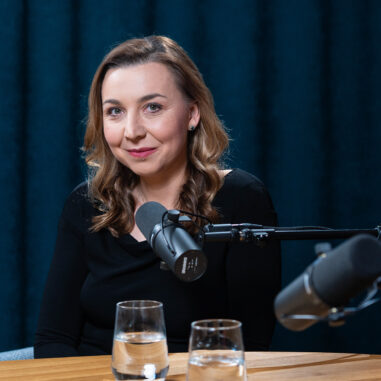
Dementia syndromes - how to recognise and where to seek help? Episode 43
With a growing elderly population, society faces the inevitable challenges of an increasing prevalence of neurodegenerative diseases. From Alzheimer's disease to Parkinson's to amyotrophic lateral sclerosis (ALS), these conditions cast a shadow over the lives of both patients and their loved ones. In the latest episode of the programme 'Po pierwsze Pacjent', Monika Rachtan talks to Professor Urszula Fiszer, MD, a specialist in neurology from the Orlowski Hospital in Warsaw, about these complex conditions. The conversation explores not only the medical aspects of neurodegenerative diseases, but also focuses on their impact on the daily lives of patients and their families, emphasising the importance of support, understanding and empathy in the care process.
Neurodegenerative diseases
Neurodegenerative diseases are characterised by the progressive loss of neurons, the key nerve cells responsible for the proper functioning of the brain. Professor Urszula Fiszer, noting the importance of neurons, emphasises: "Neurons are the nerve cells in the brain that are responsible for its work, for all our functions, not only intellectual functions, but also motor functions. Without neurons we do not function." The destruction of these cells leads to problems with movement (ataxia) or reduced mental performance (dementia), which is characteristic of diseases such as Alzheimer's and Parkinson's.
The most common neurodegenerative conditions include:
- Alzheimer's disease
- Parkinson's disease
- Prion diseases, rare conditions that cause rapidly progressive dementia.
- Amyotrophic lateral sclerosis
- Huntington's disease
- Spinal cerebellar ataxia
- Spinal muscular atrophy
The guest of the episode explains that the loss of neurons in these diseases means that our brain and body stop functioning as they should. It's a bit like a plant without water, without healthy neurons, our body and mind can't work properly.
Causes
Although older people are most often affected by neurodegenerative diseases, it is important to remember that younger generations may also be at risk. Even children and adolescents can experience brain changes that increase the risk of developing dementia syndrome in the future. As Professor Fiszer notes, dementia is not exclusive to the elderly. Early-onset dementia can affect people as young as 30 years old.
Both genetic predisposition and environmental factors, including head trauma or exposure to toxic substances, can contribute to the development of neurodegenerative diseases in both older and younger people. It is a reminder that neurodegeneration is an issue that affects us all, regardless of age. The expert emphasises the importance of prevention and early recognition of warning signs.
Understanding the dementia syndrome
Dementia syndrome represents a global and permanent decline in intellectual performance resulting from extensive and irreversible brain damage. It is a condition that can occur as a consequence of various neurodegenerative diseases, including Alzheimer's disease, but manifests with a broader spectrum of problems than just memory loss. Prof Urszula Fiszer emphasises that dementia syndrome can lead to increasing limitations in many areas of human functioning, not only in terms of memory and learning, but also in the ability to reason, plan activities, communicate or orient in time and space.
Typical symptoms of dementia syndrome include:
- Problems with memory and learning ability
- Impaired reasoning, counting, abstracting and comprehending new situations
- Reduced language competence and communication difficulties
- Problems with orientation in time, space and even recognising one's own identity
The professor also points to significant emotional and motivational changes, personality changes and a progressive decline in independence as integral parts of the dementia syndrome. These changes affect not only the sufferer but also those around them, family and friends, who have to adapt to the new situation and find ways to support their loved ones.
Activity and neurodegeneration
In the context of the fight against neurodegenerative diseases, keeping older people physically and mentally active is crucial. Urszula Fiszer emphasises how harmful a lack of it can be. It is the sedentary lifestyle, lack of exercise and lack of interest that can accelerate the development of the disease and even worsen its symptoms. In her opinion, the key to mental and physical health is active participation in social life, which should be supported both by the family and by social programmes.
The conversation points to two groups of seniors: those who see retirement as an opportunity for activity and new experiences, and so-called 'couch potatoes' who limit their activities to a minimum once their working lives are over. The guest of the episode points out that activating seniors is possible by offering them activities tailored to their interests and preferences, which is essential for delaying the symptoms of dementia syndrome and other neurodegenerative diseases.
Community initiatives
Urszula Fiszer also emphasises the importance of individual approaches and local initiatives that can motivate older people to become more active. Activities to activate seniors should be supported at various levels - by families, local communities and government programmes. The role of social education is also important here, with the aim of changing attitudes to old age and showing that seniors are an important and active part of society.
A guest on the episode calls for increased public awareness of the impact of physical and mental activity in delaying or alleviating the symptoms of neurodegenerative diseases. She emphasises that each of us has the potential to support older people in their daily pursuit of health and wellbeing, as well as in the prevention of diseases that can significantly affect their quality of life.
Challenges
When faced with neurodegenerative diseases, patients and their families face challenges that go far beyond the medical aspects. Urszula Fiszer emphasises that one of the biggest barriers in the fight against these diseases is the social stigmatisation of those affected. Society is often not ready to accept people with neurodegenerative disease. She points out the problems associated not only with the advanced stages of the disease, but also with situations where the person is still physically fit, but changes in the brain are already visible.
In the context of neurodegenerative diseases, it becomes extremely important not only to have professional medical support, but also to humanise medicine, an approach that puts people and their needs first. The programme host reminds us that many patients struggling with neurodegenerative diseases remain unrecognised and underserved, often remaining alone in their daily lives. We encounter them in a variety of situations where their difficulties can be misinterpreted as slowness or indecision: "We should not be annoyed at an elderly person who takes longer to count money at the checkout or cannot remember the word they want to use," she points out. Such situations require us to be empathetic and to understand that behind these behaviours may be a struggle with an illness that we are unable to see at first glance. It's a reminder that each of us can contribute to building a more empathetic society, especially towards older people who may be struggling with the limitations of neurodegeneration.
Public education and awareness building around neurodegenerative diseases are essential to break down stigma and promote a more open and accepting society. It is necessary to work on changing the perception of neurodegenerative diseases, to show that patients are still full members of society who deserve respect, understanding and support. Changing attitudes towards neurodegenerative diseases and people living with them can lead to better social inclusion, reduced feelings of isolation and an improved overall quality of life for patients and their families.
The Patient First programme is available on multiple platforms, including Spotify, Apple Podcasts and Google Podcasts.
Source
- Neurodegenerative diseases and psychotic disorders - https://edraurban.pl/ssl/book-sample-file/choroby-otepienne-elsevier-essentials/pdf/choroby_otepienne_.pdf
- Neurodegenerative syndromes - https://interforestclinic.wum.edu.pl/sites/klinikasolec.wum.edu.pl/files/zespolu_neurodegeneracyjne.pdf
- Early-onset dementia - Dr Anna Barczak -. https://bip.brpo.gov.pl/sites/default/files/2022-01/Otępienie%20o%20wczesnym%20poczatku%20dr%20Anna%20Barczak_0.pdf
Transcription
Monika Rachtan:
Hi, I'm Monika Rachtan and welcome to another episode of 'Patient First'. I am 30 years old and I never thought that dementia diseases could affect me. However, it turns out that even 30% people in their 80s have symptoms of such diseases. The important thing is that they also affect younger people. Today, I will talk to Prof Urszula Fiszer, a specialist in neurology, about this topic.
Ursula Fiszer:
Good morning, Madam Editor.
Monika Rachtan:
Professor, I mentioned 'dementing diseases' and 'dementia syndromes'. Could you explain to our listeners what these conditions are?
Ursula Fiszer:
Thank you for the invitation. Dementia syndromes are an extremely important topic. They are diseases of civilisation, where dementia manifests itself in reduced intellectual function and behavioural disorders. They can be a symptom of many brain diseases, such as Alzheimer's disease, which is the most common disease of civilisation today, or cerebrovascular diseases.
Monika Rachtan:
But this dementia syndrome is not just a concept, is it? It determines the sick person's behaviour, introducing visible and acute problems for him or her.
Ursula Fiszer:
Correct. The symptoms at the beginning can be very subtle, like torsional memory impairment. The patient may not remember activities performed recently, despite excellent long-term memory. This is compounded by speech difficulties and other minor symptoms. Unfortunately, over time the symptoms increase, causing greater difficulties in functioning.
Monika Rachtan:
What can we do to pick up on these subtle changes, e.g. in a loved one who is starting to show such symptoms?
Ursula Fiszer:
Problems, like not remembering pointing days or difficulty naming objects, are important. Changes in behaviour, such as constantly looking for objects in the house, are also a signal. Any change in behaviour should be noted, as it may indicate the beginnings of dementia.
Monika Rachtan:
Irritability can be a symptom of many diseases. A recent guest on the programme mentioned that she had hypothyroidism.
Ursula Fiszer:
Your editor raises a very important point. In the case of such symptoms, the patient should be carefully examined. A detailed history of the patient's difficulties, information from the environment, a physical examination and a neurological examination are important. We should also think about systemic diseases by performing basic tests such as a morphology, thyroid hormone tests, glucose levels, as well as specialised neuroimaging tests such as a CT scan or MRI. These symptoms can indicate dangerous diseases, such as a brain tumour, so early diagnosis and proper differentiation are key.
Ursula Fiszer:
Degenerative diseases often have no effective causal treatment, but we can treat other, very similar diseases effectively.
Monika Rachtan:
The professor mentioned an ideal world where the patient has access to extensive diagnostics. What about the reality, where the healthcare system has its limitations?
Ursula Fiszer:
Thank you for your compliments. Indeed, healthcare has its imperfections. In the first instance, a patient with worrying symptoms should go to their primary care physician. If relatives cannot accompany, it is worthwhile for them to write down the symptoms they are observing and give them to the patient. It helps a lot if the patient brings such a list to the doctor. Simple tests can initially assess the patient's cognitive function.
Monika Rachtan:
What do these tests consist of?
Ursula Fiszer:
These are psychological tests in which the patient performs written, drawing tasks and we assess their intellectual functions in points. A full psychological examination can only be carried out by a psychologist. Diagnosis and assessment of neurological conditions require detailed investigations, including basic blood tests and assessment of cognitive function. The patient should then go to a neurologist for a more thorough examination, which may reveal non-pyramidal symptoms, such as discrete tremor or rigidity, indicative of specific conditions. Neuroimaging studies, which vary in availability across the country, are also important.
Monika Rachtan:
Is it true that there is now a wait of over 100 days for a description of an MRI or CT scan?
Ursula Fiszer:
Well, the information on this varies. At our centre, we can have an MRI description even within half an hour. A lot depends on the place where the examination is performed. I suggest asking the radiologists for details. Personally, I do not encounter any problems in obtaining descriptions of these examinations.
Monika Rachtan:
I have heard of problems with staff shortages in the health service.
Ursula Fiszer:
Yes, these problems do not only affect radiology, but to a lesser extent. Greater difficulties arise in other specialties. Health care in Poland is indeed facing difficulties.
Monika Rachtan:
If a patient has visited a primary care physician and initial tests indicate a problem, what next?
Ursula Fiszer:
Accurate diagnosis is important, as some symptoms may be due to treatable conditions, such as syphilis or endocrine disorders. Degenerative diseases, such as Alzheimer's disease, have no causal treatment, but there is symptomatic therapy to slow down the disease process. Modern therapies are being introduced, such as intravenously administered antibodies, although this treatment is still being investigated. It is also important for patients to be provided with appropriate management indications.
Monika Rachtan:
How should such a patient proceed?
Ursula Fiszer:
Lifestyle changes are key. Prevention of neurological diseases from a young age is important. Education and higher education can delay the progression of intellectual disorders. In middle age, it is important to take care of health, treat hypertension, cardiovascular disorders and pay attention to obesity and a proper diet to avoid vascular atherosclerosis, which affects the development of degenerative diseases.
Monika Rachtan:
Professor, I return to the subject of younger people, which you mentioned, in the context of education. We recently had Professor Adam Antczak as a guest who spoke about how RSV flu can cause brain damage in children, which affects their functioning at school. Could this affect the incidence of dementia?
Ursula Fiszer:
The effect of infections, including viral infections, on the acceleration of dementia syndromes has long been known. Infections can be a direct cause of dementia or influence inflammatory processes in degenerative diseases. These diseases involve the death of neurons damaged by pathological proteins. Inflammatory processes and even bacterial flora influence this.
Monika Rachtan:
So abnormal bacterial flora can also promote disease?
Ursula Fiszer:
Yes, abnormal flora can promote inflammatory processes in the brain.
Monika Rachtan:
Can you, Professor, explain what the neurons are responsible for?
Ursula Fiszer:
Neurons, or nerve cells, are responsible for all our functions - intellectual and motor. Without them, we are unable to function.
Monika Rachtan:
Coming back to obesity, which can also contribute to dementia syndrome?
Ursula Fiszer:
Obesity, often associated with diabetes, can influence degenerative brain diseases. There are theories that Alzheimer's disease, for example, is 'type 3 diabetes', which involves the brain's resistance to insulin and accelerates degenerative processes.
Monika Rachtan:
What about addictions, like alcohol or tobacco?
Ursula Fiszer:
Alcohol and tobacco certainly have an impact, with tobacco especially in older age. In addition to avoiding these substances, physical and intellectual activity and good nutrition are important in prevention.
Monika Rachtan:
How do we get society active, especially older people who are leaving the labour force and becoming 'couch potatoes'?
Ursula Fiszer:
Activities they enjoyed before should be suggested, and time spent being active and social should be encouraged. A life spent on the sofa with a remote control is the worst choice, quickly leading to dependence on the environment and a worsening of dysfunction.
Monika Rachtan:
Professor, do you think that systemic solutions are needed to activate seniors? We have communities organising various activities, but no one will force seniors to participate. Should there be solutions, such as jobs for seniors for two hours a day for which they receive a token payment? I was in a restaurant where an elderly gentleman with a 'Master of Hospitality' badge was working and he greeted us with a smile. It made him happy.
Ursula Fiszer:
Your editor reminded me of the situation in Tokyo. There, I also met an elderly person in a restaurant who was taking care of the guests. The owner, who was about 100 years old, noticed that I did not like to eat with chopsticks and brought me European cutlery. This was remarkable to me and shows how important it is to involve senior citizens.
Monika Rachtan:
So maybe we don't need systemic change, but rather more awareness and a willingness to care for seniors. By giving them attention, they can also take care of us.
Ursula Fiszer:
It is a question of social awareness. It is important that we keep active and socialise from a young age. Having hobbies is important, and in middle age we should pay attention to the symptoms of depression, which can be confused with dementia syndrome.
Monika Rachtan:
What are the symptoms of depression?
Ursula Fiszer:
Symptoms include lowered mood, apathy, slowing down and impaired intellectual function. Depression can be treated and is often confused with dementia syndrome.
Monika Rachtan:
How to encourage seniors to treat their depression?
Ursula Fiszer:
This is difficult when the patient does not want help. You can offer to see a doctor at home and convince them that treatment can improve their condition. Patient organisations can also help by offering support and information.
Monika Rachtan:
What can the younger generation do to help seniors with depression?
Ursula Fiszer:
Encouragement and collaboration with patient organisations can be key. Conversation and support are important and can motivate seniors to take up treatment and be active.
Monika Rachtan:
Our programme partner is the Institute for Patient Rights and Health Education, which actively supports patients and works with patient organisations. The Institute's website provides information on how to help and use patient organisations.
Ursula Fiszer:
Treatment of depression improves the patient's mood, normalises sleep and activity. Sleep is very important for the prevention of dementia syndromes. To ensure proper sleep, a dark environment, avoidance of screens before bedtime and relaxation are important.
Monika Rachtan:
What should proper sleep look like at different ages?
Ursula Fiszer:
Sleep should be continuous, without periods of awakening. A dark environment, avoidance of screens and relaxation before bed are important.
Monika Rachtan:
Can depression co-exist with dementia syndrome?
Ursula Fiszer:
Yes, it is a difficult diagnostic situation, but specialists can distinguish this and use antidepressants.
Monika Rachtan:
What are the pharmacological treatments for dementia diseases?
Ursula Fiszer:
Cholinesterase inhibitors are used in Alzheimer's disease. Transdermal systems are also available. It is important to use drugs appropriate to the type of disease and neurotransmitter. In advanced stages, drugs acting on the excitatory receptor are also used. Modern therapies, such as monoclonal antibodies, are used with caution.
Monika Rachtan:
What preventive measures are most effective?
Ursula Fiszer:
Prevention, i.e. a healthy diet, physical and mental activity, is now more effective than treatment of degenerative diseases. Prevention and building intellectual reserve are key.
Monika Rachtan:
Although we convey a lot of difficult information and concepts today, you should not be afraid to do so. If you don't understand something, ask. This is a very important topic and it is crucial that we start taking care of ourselves now, when we are younger and do not yet have disease symptoms, instead of waiting for the need for treatment.
Ursula Fiszer:
The most important thing is to take care from an early age, to pay attention to small changes in the behaviour of loved ones that may indicate dementia syndromes, and to provide care and support to older people with such problems. This is a very difficult situation for them and their carers.
Monika Rachtan:
I remind you that many older people may not have a diagnosis and may be lonely. We should be understanding and patient with seniors who may have difficulties with daily activities.
Ursula Fiszer:
Humanising medicine means treating the patient as a human being, not just as an object of study. Despite technological advances, the patient should always come first.
Previous episodes

Who is the coordinator and how does she help a cancer patient. Episode 42
The role of the oncology treatment coordinator goes far beyond administrative tasks, becoming the foundation of emotional support for patients when faced with a diagnosis

Bariatric surgery or how gastric reduction combats obesity. Episode 41
Bariatric surgery is a key solution for people struggling with obesity for whom other treatments have proved ineffective

You are not alone! A common way through cancer thanks to foundations like OnkoCafe. Episode 40
The talk sheds light on how the oncology side of healthcare in Poland has changed over the years

Urinary incontinence - more than a medical problem. Episode 39
Urinary incontinence, although often seen as a strictly medical problem, also has a profound social dimension





